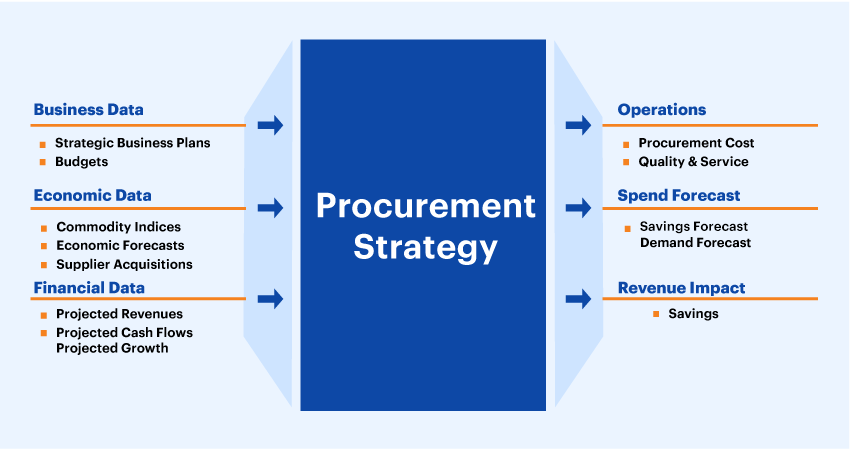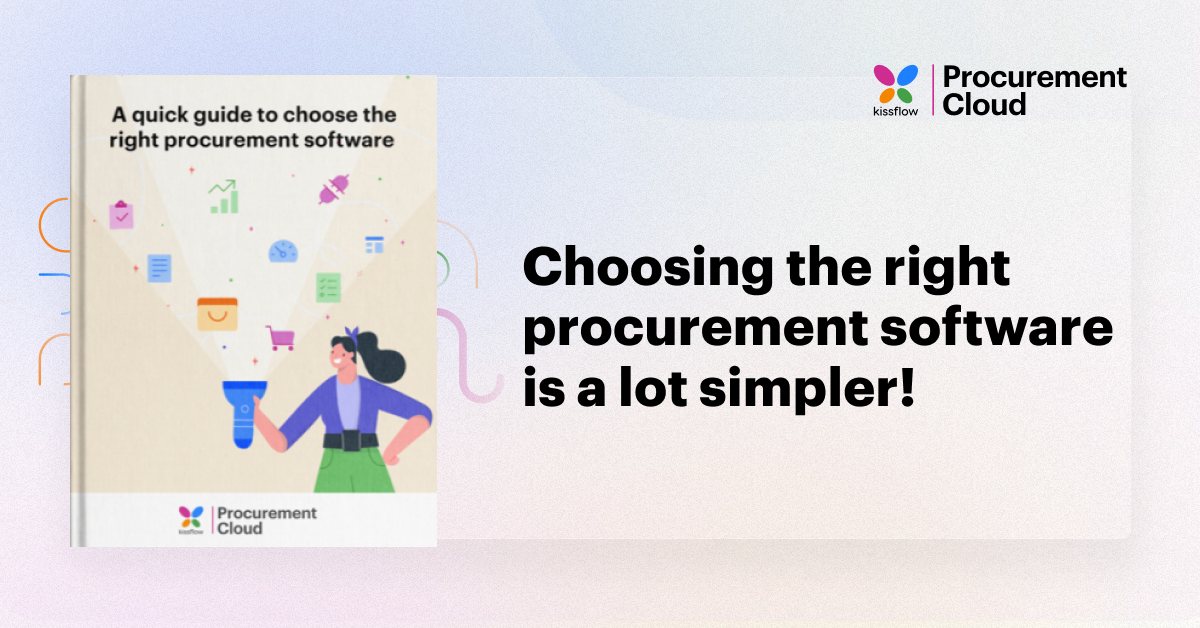What is a Procurement Contract?
A procurement contract is a legally binding agreement between a buyer and a seller. In it, the seller agrees to make supplies available to the buyer, or undertake the buyer’s project, meeting certain specifications, and offering a set price (often with volume discounts).
In return, the buyer agrees to either take delivery of and pay for a specified volume of the seller’s supplies or reimburse for the cost incurred in creating the supplies or undertaking a project.
A procurement contract provides the groundwork for building and managing the customer-vendor relationship and eliminates the guesswork. To manage suppliers better, we have put together a strategic sourcing guide. Download it now to improve supplier relationships and cost savings.
What is included in a procurement contract?
The essence of a procurement contract is to spell out the terms governing the relationship between the buyer and seller. In other words, the procurement contract lays out what both buyer and seller are expected to deliver and thus, what they can expect from one another.
The main contents of a procurement contract include the following.
Monitoring and performance control
Monitoring contract efficiency, managing procurement relationships, making adjustments and corrections as required, and closing out contracts are all part of this process.
Monitoring and performance control ensures each party receives the benefits of the contract; protects each party’s rights; and makes sure that each party fulfills their contractual obligations.
Manage all your contracts in one place using Kissflow!
Receipt, inspecting, and acceptance
Upon receipt of supplies made by the seller, the inventory needs to be inspected to ensure it meets the specifications agreed upon. How it will be managed is set forth in the procurement contract.
Contract termination
If at any time both sides of a procurement contract should find their differences irreconcilable, the contract outlines terms under which it will be nullified so both parties go their ways.
Alternative dispute resolution
Instead of taking issues to court (which often proves profitable for the lawyers only), a procurement contract can outline how disputes will be fulfilled to ensure that any issues that potentially come up during the course of the buyer-supplier relationship will have a pattern for settling them.
Financial management and payment
This stipulates how financial matters will be managed including invoicing, payment terms, methods, and preferences. A procurement contract makes it clear how the money will change hands should the terms of the contract be met.
Performance securities
A procurement contract guarantees a performance quality that both buyer and seller are obligated to expect and in turn deliver during the course of their working relationship.
Contract completion and closeout
A procurement contract acts as the guidebook that details how supplies will change hands, in what manner, and what behavior should be deemed acceptable.
Take control of your contracts with our easy-to-use software.
Types of procurement contracts
Depending on your situation, what you’re looking to achieve, and your respective tolerance for risk, there are several types of procurement contracts you can agree on with your vendors. And it’s important to note that a contract is essentially a risk management tool that gives both parties expected performance the other can guarantee.
Here are the three main types of procurement contracts obtainable, plus a breakdown of the different branches that make them up.
Fixed price contract
A fixed-price contract guarantees that a buyer will get specific pricing for products or services, provided the buyer orders a minimum required amount of inventory.
Fixed-price contracts are ideal for essential supplies that are critical to the buyer’s supply chain since the contract locks the buyer into an agreement that guarantees them supplies at reasonable pricing, provided they keep to the terms of the contract
That is to say, a fixed price contract guarantees supplies in return for a guaranteed minimum order quantity.
Fixed-price contracts are subdivided into three main niches, namely:
- Firm Fixed Price
In the most basic fixed-price contract, a firm fixed price holds a guarantee between a buyer and a supplier that the latter will make a minimum order volume and that the seller will provide them at a specified cost.
- Fixed Price & Incentive Fee
An FPIF procurement contract stipulates that the buyer will pay a fixed price for a minimum order amount of supplies, plus an incentive should the supplier meet and exceed the terms of the contract.
As the name implies, the seller is guaranteed payment for the supplies offered and the buyer is guaranteed a specified volume. The buyer promises a bonus should the required order volume be available for delivery at the promised price.
This kind of contract often comes into play when there’s scarcity for the particular supply the buyer is looking to lock down a deal for the future.
- Fixed Pricing with Economic Price Adjustment
An FPEPA contract is such that the buyer and supplier are locked into an agreement where the buyer agrees to buy a certain volume of supplies and the seller agrees to supply them at a fixed price—provided the cost of producing the product or service in question remains the same. If production prices for the supplier increase, the supplier has leeway to adjust appropriately to protect their margins.
Say, after an FPEPA contract is signed that inflation sets in, and the supplier’s costs rise beyond the levels agreed within the contract. On his part, the supplier is justified to raise the pricing for the supplies delivered to the buyer in turn.
Fixed-price contracts are often entered into when the buyer is looking to acquire a pre-built product with a fixed price that can be expected to remain stable over a period of time. The supplier has invested into producing the inventory and the buyer, on the other hand, has an idea of how much inventory they’ll need for the near future and wants to guarantee supply.
Cost reimbursement contract
A fixed-price contract holds both buyer and seller to a guarantee that:
- The buyer will make a minimum volume of orders from the seller, and that
- The seller will provide an optimum price for the buyer—as long as the buyer follows through with the minimum required order
On the other hand, a cost-reimbursement contract specifies that whatever the capital cost a seller invests into developing a product, service, or undertaking a project, the buyer will reimburse it.
Cost reimbursement contracts fall into three main categories, namely:
- Cost Plus Fixed Price
Under the CPFF model, the seller delivers a quote for the product, service, or project the buyer is looking to get delivered. Quantity and quality specifications are laid down and the seller is expected to carry the expenses for undertaking the project from scratch until completion.
Upon completion, the buyer reimburses the seller the expenses incurred in the course of delivering the order plus a fixed bonus, say a percentage of the overall figure that the order amounted to.
Should the order be completed unsatisfactorily (i.e. without meeting up to the buyer’s requirements) the seller may have to bear the cost associated with the unusable product since they deviated from the laid down terms in the contract.
- Cost Plus Incentive Fee
Using the CPIF model, the seller agrees to foot the cost of creating the order the buyer has requested. In return, once the order is completed successfully (i.e. in accordance with all the specifications agreed upon in the contract), the buyer is obligated to reimburse the seller any cost incurred with the project, as well as an agreed incentive fee for successfully delivering the order.
Conversely, should it be the seller fails to meet up satisfactorily with the terms of the contract, a Cost Plus Incentive Fee contract requires the buyer and seller to split the cost of the unsuccessful project.
- Cost Plus Award Fee
A CPAF contract is designed such that the seller provides the goods, and services, or undertakes the project as agreed with the buyer. Once completed, the buyer reimburses the supplier for their costs and an award fee at the buyer’s discretion. The award fee can either be as large or as small as the buyer wishes.
Cost reimbursement contracts place the capital cost for developing and providing the buyer’s order on the seller but demand the buyer reimburse the seller with interest if the terms of the contract are met.
Cost reimbursement contracts often come into play in a situation where the buyer is looking to buy a custom product or service, or where the seller is undertaking a project that’ll require ongoing effort to complete, rather than just collecting payment and shipping them to the buyer.
Cost reimbursement contracts are designed so since the cost of delivering the buyer’s order is not yet certain so the seller agrees to undertake the product development or project and get reimbursed in full when the stipulated targets are delivered.
Time & material contracts
Under a time and material contract, the buyer agrees to pay for the time and material invested into the product or service desired. In return, there’s a binding agreement that the time and material will not exceed a certain volume in order to keep expenses reasonable and avoid fraud.
A prime example of where this comes into play would be in the digital services industry where a freelancer might offer a quote of 100 hours to deliver a newly built website. The business ordering the website counters and bargains for the website development project to not exceed 80 hours, priced at $100 per hour.
Once both parties have an agreement, the project can proceed. And when the website project is fully delivered, the web developer can forward an invoice for the hours spent plus other material expenses such as web hosting, premium themes, SaaS subscriptions (Cloudflare, etc.), business email setup, etc.
About Kissflow Procurement Cloud
Kissflow Procurement Cloud is a flexible procure-to-pay software that enables businesses of all sizes to streamline their procurement processes. With Kissflow Procurement Cloud, companies can streamline their procurement strategy and improve their process efficiency. Its modules include eProcurement, Punchout Catalogs, AP Automation, Supplier Portal and Management, Inventory Management, Custom Integrations, and much more in one unified platform. If you’re transitioning from manual procurement management tools or replacing disparate systems, look no further than Kissflow Procurement Cloud.
Businesses rely on Process Owners and Managers to optimize operations and improve efficiency. A low-code system approach makes workflow automation easier than ever. Find out how Kissflow transforms process management.
Get Started with Kissflow Platform to find out more about its benefits
Simplify Contract Management.
Recommended Reading

How to Build a Solid Procurement Strategy for 2023 [9 Steps]

Top 5 procurement tools available in the market and which to choose




